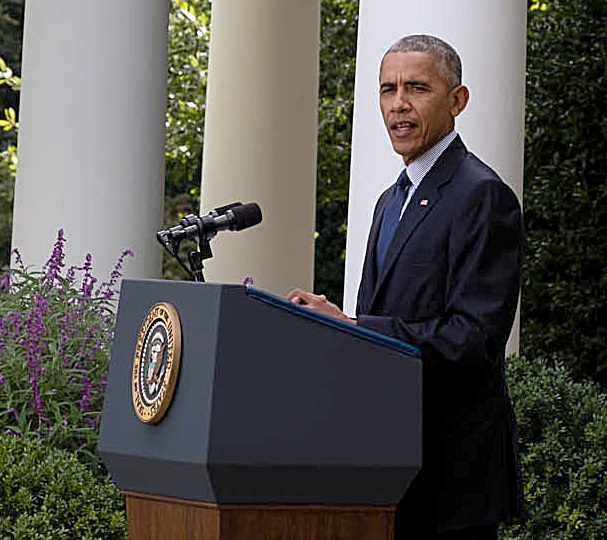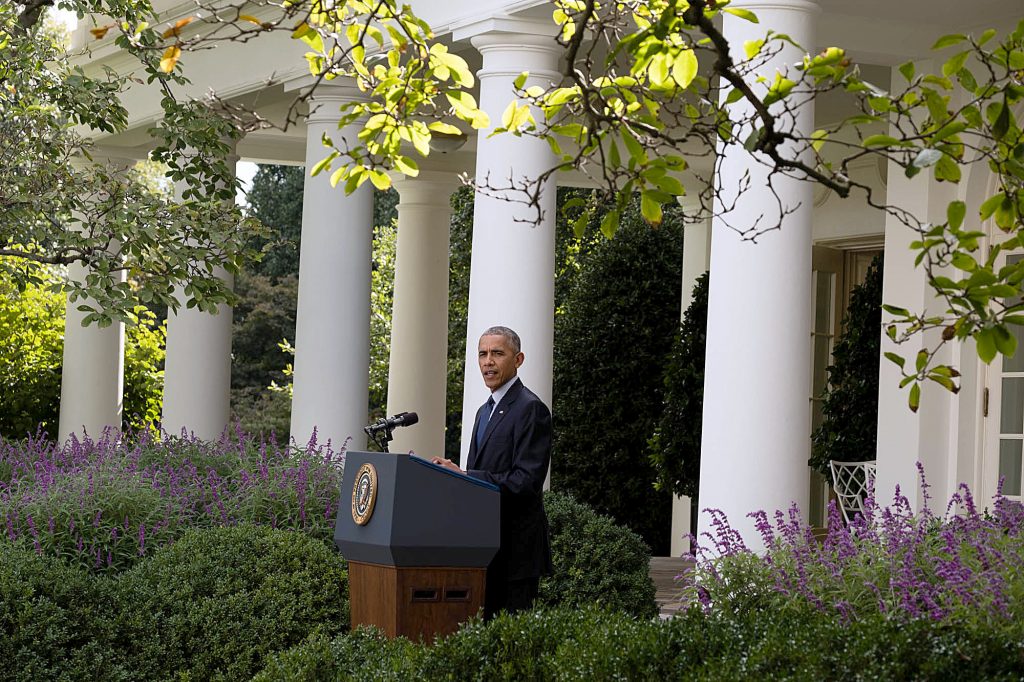
From the White House, yesterday:
“President Obama announced that enough countries have acted to bring the Paris Agreement into force — a historic step forward in saving the one planet we’ve got.”
President Obama:
Ten months ago, in Paris, I said before the world that we needed a strong global agreement to reduce carbon pollution and to set the world on a low-carbon course. The result was the Paris Agreement. Last month, the United States and China — the world’s two largest economies and largest emitters — formally joined that agreement together. And today, the world has officially crossed the threshold for the Paris Agreement to take effect.
Today, the world meets the moment. And if we follow through on the commitments that this agreement embodies, history may well judge it as a turning point for our planet.[…]
I also want to thank the people of every nation that has moved quickly to bring the Paris Agreement into force. I encourage folks who have not yet submitted their documentation to enter into this agreement to do so as soon as possible. And in the coming days, let’s help finish additional agreements to limit aviation emissions, to phase down dangerous use of hydrofluorocarbons — all of which will help build a world that is safer, and more prosperous, and more secure, and more free than the one that was left for us.
That’s our most important mission, to make sure our kids and our grandkids have at least as beautiful a planet, and hopefully more beautiful, than the one that we have. And today, I’m a little more confident that we can get the job done.

Full transcript of President Obama’s remarks and a statement from Secretary of State John Kerry are below.
Transcript: Remarks by the President on the Paris Agreement
Rose Garden
**Please see below for a correction, marked with an asterisk.
3:30 P.M. EDT
THE PRESIDENT: Good afternoon, everybody. Today is a historic day in the fight to protect our planet for future generations.
Ten months ago, in Paris, I said before the world that we needed a strong global agreement to reduce carbon pollution and to set the world on a low-carbon course. The result was the Paris Agreement. Last month, the United States and China — the world’s two largest economies and largest emitters — formally joined that agreement together. And today, the world has officially crossed the threshold for the Paris Agreement to take effect.
Today, the world meets the moment. And if we follow through on the commitments that this agreement embodies, history may well judge it as a turning point for our planet.
Of course, it took a long time to reach this day. One of the reasons I ran for this office was to make America a leader in this mission. And over the past eight years, we’ve done just that. In 2009, we salvaged a chaotic climate summit in Copenhagen, establishing the principle that all nations have a role to play in combating climate change. And at home, we led by example, with historic investments in growing industries like wind and solar that created a steady stream of new jobs. We set the first-ever nationwide standards to limit the amount of carbon pollution that power plants can dump into the air our children breathe. From the cars and trucks we drive to the homes and businesses in which we live and work, we’ve changed fundamentally the way we consume energy.
Now, keep in mind, the skeptics said these actions would kill jobs. And instead, we saw — even as we were bringing down these carbon levels — the longest streak of job creation in American history. We drove economic output to new highs. And we drove our carbon pollution to its lowest levels in two decades.
We continued to lead by example with our historic joint announcement with China two years ago, where we put forward even more ambitious climate targets. And that achievement encouraged dozens of other countries to set more ambitious climate targets of their own. And that, in turn, paved the way for our success in Paris — the idea that no nation, not even one as powerful as ours, can solve this challenge alone. All of us have to solve it together.
Now, the Paris Agreement alone will not solve the climate crisis. Even if we meet every target embodied in the agreement, we’ll only get to part of where we need to go. But make no mistake, this agreement will help delay or avoid some of the worst consequences of climate change. It will help other nations ratchet down their dangerous carbon emissions over time, and set bolder targets as technology advances, all under a strong system of transparency that allows each nation to evaluate the progress of all other nations. And by sending a signal that this is going to be our future — a clean energy future — it opens up the floodgates for businesses, and scientists, and engineers to unleash high-tech, low-carbon investment and innovation at a scale that we’ve never seen before. So this gives us the best possible shot to save the one planet we’ve got.
I know diplomacy *can be [isn’t always] easy, and progress on the world stage can sometimes be slow. But together, with steady persistent effort, with strong, principled, American leadership, with optimism and faith and hope, we’re proving that it is possible.
And I want to embarrass my Senior Advisor, Brian Deese — who is standing right over there — because he worked tirelessly to make this deal possible. He, and John Kerry, Gina McCarthy at the EPA, everybody on their teams have done an extraordinary job to get us to this point — and America should be as proud of them as I am of them.
I also want to thank the people of every nation that has moved quickly to bring the Paris Agreement into force. I encourage folks who have not yet submitted their documentation to enter into this agreement to do so as soon as possible. And in the coming days, let’s help finish additional agreements to limit aviation emissions, to phase down dangerous use of hydrofluorocarbons — all of which will help build a world that is safer, and more prosperous, and more secure, and more free than the one that was left for us.
That’s our most important mission, to make sure our kids and our grandkids have at least as beautiful a planet, and hopefully more beautiful, than the one that we have. And today, I’m a little more confident that we can get the job done.
So thank you very much, everybody.
END
3:35 P.M. EDT
~~~
The #ParisAgreement will enter into force in 30 days.
Secretary @JohnKerry’s statement: https://t.co/Q9h8B77PA2 pic.twitter.com/PT4kY1sSTj— Department of State (@StateDept) October 5, 2016
Press Statement by Secretary of State John Kerry: The Paris Agreement To Enter Into Force
Nearly 200 nations made history in Paris last December, when they came together around the most ambitious, inclusive climate agreement ever negotiated. I was honored to represent the United States in those negotiations and to be in the conference hall as the text was gaveled in. Immediately following the adoption of the Paris Agreement, President Obama and I set out on a global push, urging our counterparts around the world to help ensure the swift implementation and early entry into force of the Agreement. On Earth Day of this year, I joined representatives from a record-breaking number of parties to sign the Agreement, signaling our nations’ intent to formally join it. Today, less than six months later, enough countries – representing enough of the world’s greenhouse gas emissions – have submitted their instruments to formally join. The Paris Agreement will enter into force in 30 days.
For many years, scientists have been warning us that climate change is real, it is happening now, and, barring global action to change the course our planet is on, it will have devastating impacts in nearly every corner of the world. As someone who has spent the better part of my professional life focused on fighting climate change, I have seen the global community begin to heed that warning time and again, only to fall far short of the kind of worldwide action that will make a difference.
Today it is crystal clear that we have finally woken up. We have learned from the false starts of the past, and we are now – finally – on the path to protecting the future for our children, our grandchildren and generations to come.
The rapid entry into force timeline underscores the widespread recognition of the urgency at hand. It is a testament to the continued determination of states large and small, rich and poor, to act on the moral, social, and economic imperative to address the dangerous impacts of climate change. Together, the world’s largest emitters have worked to overcome the divides that have led to the demise of past attempts, and are instead leading the way together. The reason we were able to pass the required threshold so early is that many of the largest emitters in the world – including the United States, China, India, the EU and a number of its member states – recognized the need to continue the momentum from Paris and joined swiftly to bring this Agreement into force as quickly as possible.
Our shared commitment will amplify the powerful signal the Paris Agreement sent to world markets that we are moving toward a clean economy, both in the United States and around the globe, with unprecedented resolve. Markets and business thrive on certainty. The certainty that the deal is entering into force gives them added confidence that the transition toward a low-carbon future is not only happening – but accelerating – driving a virtuous cycle of greater innovation and investment.
But the hard work is still far from over, and we cannot for a moment rest on our laurels. Much is left to do, but if we keep our collective focus on steady progress, this month could shape up to be one of the most consequential in history for climate action. In addition to the Paris Agreement reaching the threshold to enter into force, this week the International Civil Aviation Organization Assembly is working to adopt the first ever industry-wide market based measure to set international aviation on a path toward sustainable, carbon-neutral growth. And in less than a week, the Parties to the Montreal Protocol will meet with the goal of adopting an amendment to phase down the use of hydrofluorocarbons, which could avoid up to a half a degree of warming by the end of the century. Achieving successful and ambitious outcomes on these two vital negotiations would help the world reach the goals we outlined in the Paris Agreement and, in doing so, prevent the worst impacts of climate change.

Thanks, President Obama! #ThanksObama
History will remember him for this – too bad so many people here do not see how momentous this was.